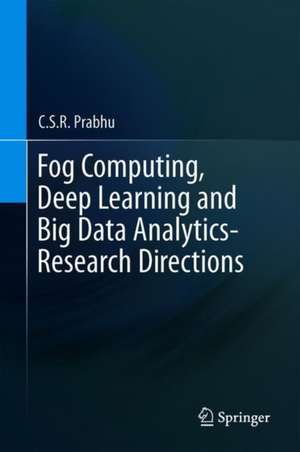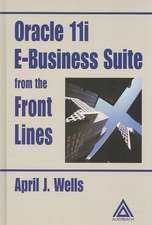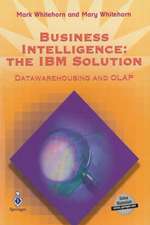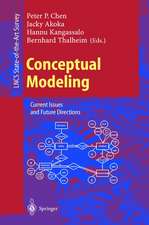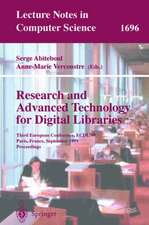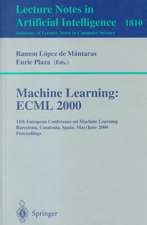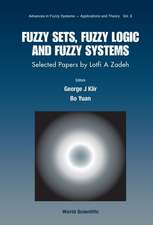Fog Computing, Deep Learning and Big Data Analytics-Research Directions
Autor C.S.R. Prabhuen Limba Engleză Hardback – 16 ian 2019
This book provides a comprehensive picture of fog computing technology, including of fog architectures, latency aware application management issues with real time requirements, security and privacy issues and fog analytics, in wide ranging application scenarios such as M2M device communication, smart homes, smart vehicles, augmented reality and transportation management.
This book explores the research issues involved in the application of traditional shallow machine learning and deep learning techniques to big data analytics. It surveys global research advances in extending the conventional unsupervised or clustering algorithms, extending supervised and semi-supervised algorithms and association rule mining algorithms to big data Scenarios. Further it discusses the deep learning applications of big data analytics to fields of computer vision and speech processing, and describes applications such as semantic indexing and data tagging. Lastly it identifies 25 unsolved research problems and research directions in fog computing, as well as in the context of applying deep learning techniques to big data analytics, such as dimensionality reduction in high-dimensional data and improved formulation of data abstractions along with possible directions for their solutions.
Preț: 925.95 lei
Preț vechi: 1157.45 lei
-20% Nou
Puncte Express: 1389
Preț estimativ în valută:
177.20€ • 184.32$ • 146.29£
177.20€ • 184.32$ • 146.29£
Carte tipărită la comandă
Livrare economică 14-28 aprilie
Preluare comenzi: 021 569.72.76
Specificații
ISBN-13: 9789811332081
ISBN-10: 9811332088
Pagini: 160
Ilustrații: XIII, 71 p. 5 illus., 1 illus. in color.
Dimensiuni: 155 x 235 mm
Greutate: 0.3 kg
Ediția:1st ed. 2019
Editura: Springer Nature Singapore
Colecția Springer
Locul publicării:Singapore, Singapore
ISBN-10: 9811332088
Pagini: 160
Ilustrații: XIII, 71 p. 5 illus., 1 illus. in color.
Dimensiuni: 155 x 235 mm
Greutate: 0.3 kg
Ediția:1st ed. 2019
Editura: Springer Nature Singapore
Colecția Springer
Locul publicării:Singapore, Singapore
Cuprins
Introduction.- Fog Application management.- Fog Analytics.- Fog Security and Privary.- Research Directions.- Conclusion.
Notă biografică
Dr. Chivukula Sree Rama Prabhu has held prestigious positions with Government of India and various Institutions. He retired as the Director General of National Informatics Centre (NIC) Ministry of Electronics and Information Technology Government of India, New Delhi, and has worked in various capacities at Tata Consultancy Services (TCS), CMC, TES and TELCO (now Tata Motors). He was also an international resource faculty for the Programs of APO (Asian Productivity Organization), and represented India on the International Panel at Venture 2004 held by APO at Osaka, Japan. He taught and researched at the University of Central Florida, Orlando and also had a brief stint as a Consultant to NASA Cape Canaveral.
Mr. Prabhu was unanimously elected and served as the Chairman of Computer Society of India (CSI), Hyderabad Chapter. He is presently working as an Advisor at KL University, Vijayawada, Andhra Pradesh and as a Director, Research and Innovation at Keshav Memorial Institute of Technology (KMIT), Hyderabad.
Textul de pe ultima copertă
This book provides a comprehensive picture of fog computing technology, including of fog architectures, latency aware application management issues with real time requirements, security and privacy issues and fog analytics, in wide ranging application scenarios such as M2M device communication, smart homes, smart vehicles, augmented reality and transportation management.
This book explores the research issues involved in the application of traditional shallow machine learning and deep learning techniques to big data analytics. It surveys global research advances in extending the conventional unsupervised or clustering algorithms, extending supervised and semi-supervised algorithms and association rule mining algorithms to big data Scenarios. Further it discusses the deep learning applications of big data analytics to fields of computer vision and speech processing, and describes applications such as semantic indexing and data tagging. Lastly it identifies 25 unsolved research problems and research directions in fog computing, as well as in the context of applying deep learning techniques to big data analytics, such as dimensionality reduction in high-dimensional data and improved formulation of data abstractions along with possible directions for their solutions.
Caracteristici
Provides a comprehensive overview of fog computing technology Explores research issues involved in the application of traditional shallow machine learning and deep learning techniques to big data analytics Identifies several unsolved research problems and research directions in fog computing
